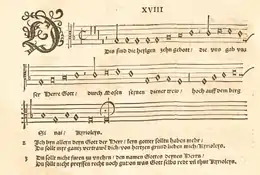Dies sind die heilgen zehn Gebot
"Dies sind die heilgen zehn Gebot" (These are the holy Ten Commandments) is a hymn by the Protestant reformer Martin Luther based on the Ten Commandments. It appeared first in 1524 in the Erfurt Enchiridion.
| "Dies sind die heilgen zehn Gebot" | |
|---|---|
| Hymn by Martin Luther | |
 The hymn in Eyn geystlich Gesangk Buchleyn, 1524 | |
| English | These are the holy Ten Commandments |
| Catalogue | Zahn 1951 |
| Text | by Martin Luther |
| Language | German |
| Published | 1524 |
History
The reformer Martin Luther wrote the hymn in twelve stanzas of four lines each as a catechetical setting of the Ten Commandments. The commandments were used for confession and for instructions.[1] After an introduction, stanzas 2 to 10 are related to the ten commandments; 11 and 12 provide a conclusion, related to Jesus.[2] In 1524, Luther published the hymn in the Erfurt Enchiridion with a hymn tune, Zahn No. 1951, based on an older melody ("In Gottes Namen Fahren wir").[1][3] The hymn is a "Leise", concluding each stanza by "Kyrieleis".[2][4]
The hymn also appeared in Johann Walter's choral hymnal Eyn geystlich Gesangk Buchleyn in 1524.[4] It appeared in 1854 in Schircks's edition of Luther‘s hymns (Geistliche Lieder), and in the hymnal Unverfälschter Liedersegen in 1851.[5] In the current Protestant German hymnal, the Evangelisches Gesangbuch, it is EG 231.
An early English translation was titled "That men a godly life might live". It was published in Richard Massie's M. Luther's Spiritual Songs in 1854, and in the Ohio Lutheran Hymnal in 1880.[1] Another English translation, used in various Lutheran hymnals since the 1950s, is titled "These Are the Holy Ten Commands."[6]
Melody and settings
The melody was assigned as for "In Gottes Namen fahren wir", but other melodies were also used, such as "Wär Gott nicht mit uns diese Zeit".[4]
Johann Michael Bach composed a chorale prelude, Jan Pieterszoon Sweelinck wrote two variations for the organ, and Johann Hermann Schein composed a setting for two soprano voices and continuo. Johann Sebastian Bach wrote a four-part setting, BWV 298; he used the chorale in the opening movement of cantata Du sollt Gott, deinen Herren, lieben, BWV 77. [7] The chorale juxtaposes the topic of the cantata, the commandment of love.[8] In his Clavier-Übung III, he dedicated two pieces to the chorale, a chorale prelude with five voices and a fughetta for a single manual, BWV 678-679.[9] Bach also wrote the first of the catechism chorale preludes, BWV 635, for the Orgelbüchlein.[10]
References
Sources
Books
- Chafe, Eric (2003). Analyzing Bach Cantatas. Oxford University Press. pp. 161–173. ISBN 9780199882977.
- Hahn, Gerhard (2015). EG 231. Dies sind die heilgen zehn Gebot (in German) (20 ed.). Vandenhoeck & Ruprecht. pp. 18–20. ISBN 9783647503431.
- Jones, Richard D. P. (2013). The Creative Development of Johann Sebastian Bach, Volume II: 1717–1750: Music to Delight the Spirit. Oxford University Press. p. 126. ISBN 978-0-19-969628-4.
- Stip, G.Ch. H. Unverfälschter Liedersegen. Рипол Классик. p. 61. ISBN 9785883760111.
- Williams, Peter (2003), The Organ Music of J. S. Bach (2nd ed.), Cambridge University Press, pp. 300–302, ISBN 0-521-89115-9
- Zahn, Johannes (1889). Die Melodien der deutschen evangelischen Kirchenlieder (in German). Vol. I. Gütersloh: Bertelsmann. p. 524.
{{cite book}}: External link in|volume=
Online sources
- "14. Dies sind die heilgen Zehn Gebot" (PDF) (in German). Luther Gesellschaft. 2017. Retrieved 4 June 2017.
- "Dies sind die heil'gen zehn Gebot". hymnary.org. Retrieved 4 June 2017.
- "These Are the Holy Ten Commands". hymnary.org. Retrieved 28 June 2023.
External links
- Dies sind die heilgen zehn Gebot (Bach, Johann Michael): Scores at the International Music Score Library Project
- Dies sind die heilgen zehn Gebot (Schein, Johann Hermann): Scores at the International Music Score Library Project
- Dies sind die heilgen zehn Gebot (Sweelinck, Jan Pieterszoon): Scores at the International Music Score Library Project
- That Man a Godly Life Might Live hymntime.org
- Dies sind die heilgen zehn Gebot BWV 298; BC F 46.1 Bach Digital
- Dies sind die heiligen zehen Gebot ("Klavierübung, Teil 3") BWV 678 Bach Digital
- Fughetta super: Dies sind die heiligen zehen Gebot ("Klavierübung, Teil 3") BWV 679 Bach Digital